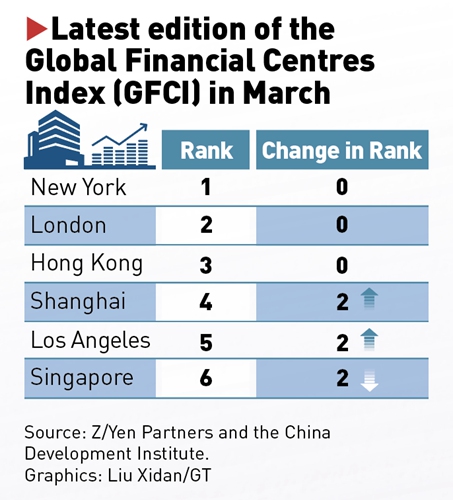HK's role as major global financial hub is on firmer footing, 25 years after its return to the motherland
25 years of integration with Chinese mainland makes city nearly crisis-proof

Photo: VCG
When Hong Kong returned to the motherland in 1997, some Western market watchers argued that the Hong Kong dollar would disappear within several years - a laughable reminder of fear-mongering that transpired following that historic event.
A quarter of a century later, not only has the Hong Kong dollar survived crises after crises, but the city's role as a global financial hub has only been further strengthened. With strong backing from the Chinese mainland through every difficult period, the Chinese SAR's financial sector is keeping up with a race for greater global clout that may pit Hong Kong against New York and London in the future.
Looking forward, though the city faces many challenges, it also has great potential and new opportunities to retain its status as a global financial center for years to come, as its integration process into the mainland forges ahead, prominent market watchers told the Global Times.
Nearly crisis-proof
When recalling the early days since the 1997 handover, observers would give credit to the HKSAR government's sobriety and effective responses under the auspices of the central government for the local financial market's weathering of the turbulent 1997-1998 Asian currency tsunami.
Such a memorable performance is considered to have paved the way for the city to weather other major crises, economists said.
During the Asian financial crisis, the HKSAR government succeeded in intervening in the foreign exchange market, with the central government's underpinning, thereby maintaining the basic stability of Hong Kong's financial market, E Zhihuan, chief economist of Bank of China (Hong Kong) Limited (BOCHK) , told the Global Times in an exclusive interview on Tuesday.
Notwithstanding the regional financial turmoil which erupted in the second half of 1997, "the exchange rate of the Hong Kong dollar remained reasonably stable under the linked exchange rate system," the Hong Kong Monetary Authority (HKMA) said in its annual report for 1997. The Hong Kong dollar, per the HKMA report, became Asia's only freely convertible currency that has survived the financial turmoil unscathed.
The fate of the local currency was contingent upon the economic strength and Hong Kong's huge foreign exchange reserves in 1997, only secondary to Japan and the Chinese mainland, rendered it difficult for short sellers to take down the Hong Kong dollar, Thomas Yeung, vice dean of the Grand China Institute of Capital Management, told the Global Times.
The sheer size of China's forex reserves over the recent decade helps to further buttress the Hong Kong economy, according to Yeung, also senior researcher at the Hong Kong City Think Tank.
Over the past 25 years, the linked exchange rate system (LERS) has played an important role in maintaining a stable local currency, fostering the local financial market and attracting foreign investment, E said. The LERS sets a floating band of HK$7.75-7.85 against the US dollar.
Back in 1996, total loans extended by the Hong Kong banking sector stood at HK$4.1 trillion ($522.51 billion). The reading hit HK$10.8 trillion in 2021, nearly triple the prior-handover level, E said. That suggests growth in local bank loans far outpaced the city's GDP expansion.
Additionally, the city's stock market, also denominated in the Hong Kong dollar, surged from HK$2.82 trillion in capitalization prior to the handover to HK$58 trillion now. The expansion of Hong Kong's banking sector and its capital market over the past 25 years speaks volumes about the local currency-denominated financial market strength, E noted.
In another sign of the city's crisis-proof capability, the HKSAR government toughened oversight amid the 2008 global financial turbulence that originated from the US subprime mortgage crisis, consequently ensuring the local financial market to operate in good shape and beefing up Hong Kong's capacity to buffer against crises, she commented.
More recently, the national security law for Hong Kong SAR that came into force in mid-2020 is seen as offering a dose of reassurance for its social stability. "The legislation provides the city's financial development with a healthier environment, boding well for Hong Kong to continue flexing its [financial] muscles," E said.
Mutual integration
Behind the city's financial prowess that has withstood the test of more than two decades of vicissitudes lies its stronger ties with the mainland, increasingly relied upon as the backing of Hong Kong's financial prominence, market watchers said, voicing optimism over Hong Kong's sustained magnetism for global capital.
As Hong Kong continues acting as a gateway connecting the mainland and the international market, with a push for more headway in linkups between the mainland and Hong Kong financial markets, and ongoing improvement in the local business environment, the city will see its attractiveness for international capital keep rising, according to E at BOCHK, expecting Hong Kong to retain a leading global financial hub.
Specifically, the impressive growth of the mainland economy prompts international capital to seek a foothold in Hong Kong to access growth opportunities resulting from the city's linkup with the mainland, the economist said, describing it as the "fundamental appeal" of the Hong Kong market.
Besides, as a free trade port facilitating free money flows, Hong Kong has long been known for its alignment with global rules and therefore acquainting foreign investors with a legal and regulatory framework similar to their home countries, she went on to say.
Hong Kong has benefited from the flow of production factors between the Chinese mainland and the world, including personnel, logistics and capital. The former two constitute the basis of Hong Kong's status as an international trade center, while the latter constitutes the basis of Hong Kong's status as an international financial center, Qi Mingyang, chairman of Shenzhen-based asset management firm Fortune Valley Capital Investment Group, told the Global Times.

In keeping up with a race for greater financial clout, priming Hong Kong for a rivalry with New York and London some day in the future, the SAR is envisioned to better capitalize on its integration into the mainland economy.
Hong Kong could function more effectively as a significant bridge between China, ASEAN nations and other members signing up for the massive Regional Comprehensive Economic Partnership, the BOCHK chief economist suggested.
The push for the Guangdong-Hong Kong-Macao Greater Bay Area would pivot more financing needs and the pursuit of more sophisticated financial services toward Hong Kong, she said, adding that China's joining a global push for carbon peak and neutrality adds fuel to the marketplace for green finance, presenting Hong Kong with a chance to turn itself into an epicenter of global green finance.
Other than that, Hong Kong that has blazed a trail in globalizing the yuan ought to strengthen its role as a global offshore yuan center, the economist said.
In 2004, the city began its offshore yuan business with the simplest banking services for individual customers. Since then, it has been rapidly expanded to an unrivaled business network including yuan-dominated loans and bonds issuance, trading settlement and establishing cross-border capital market connectivity.
Now Hong Kong is the world's largest offshore yuan business center, settling about 75 percent of the global yuan payments. By last October, the offshore yuan pools in Hong Kong had exceeded 850 billion yuan ($126.77 billion), accounting for about 60 percent of the total available in the global market.
The colossal scale of offshore yuan businesses in Hong Kong has been strongly backed by the mainland. The Ministry of Finance started selling yuan-denominated treasury bonds in Hong Kong in 2009. As of the end of May 2022, 238 billion yuan worth of yuan-denominated treasury bonds had been issued in Hong Kong.
On top of that, the HKSAR's ever closer financial tie-up with the Chinese mainland, exemplified by the expanding stock and bond linkups between the city and its mainland counterparts, makes a compelling case for the translation of the team-up into the "Pearl of the Orient" that shines even brighter in the financial arena.
Hong Kong Exchanges and Clearing Limited (HKEX), the operator of Hong Kong's stock exchange, just celebrated its 22nd anniversary on June 21. Its growth over the past 22 years parallels the substantial expansion of Hong Kong's financial markets during the period.
In 2014, the Shanghai-HK Stock Connect was launched, through which international investors can trade Shanghai stocks through HKEX and mainland investors can trade HK stocks through the Shanghai Stock Exchange. The stock connect then was extended in 2016 to cover stocks in the Shenzhen market. Bond Connect was rolled out in 2017 to allow international investors to trade and clear China bonds through Hong Kong.
The long-awaited inclusion of exchange-traded funds (ETF) into the Stock Connect was recently announced by the China Securities Regulatory Commission (CSRC) on June 24. The ETF trades under the Stock Connect are scheduled to begin on July 4, the CSRC said on Tuesday.
New important role
In the meantime, such a vital financial bridge between the mainland and the global market has been playing another important role as a second listing venue for mainland firms over recent years as US-listed Chinese mainland firms face increasing geopolitical pressure from Washington.
In response to a question from the Global Times in March, HKEX officials downplayed concerns that a flurry of pending IPOs might limit the Hong Kong bourse's capacity to welcome more homecoming listings of US-listed Chinese firms amid an ongoing US regulatory crackdown.
As of March, a total of 19 US-listed Chinese firms had gone public in Hong Kong through second listing or dual primary listing, with their total market capitalization accounting for more than 70 percent of all the over 200 US-listed Chinese firms.
Hong Kong has been well prepared for offering listing services to US-listed Chinese firms, HKSAR Finance Secretary Paul Chan Mo-po said in February.
Looking ahead, Hong Kong is set to retain its competitiveness in terms of business environment and market efficiency under the "one country, two systems" principle, laying the groundwork for the continued uplift in its role as an international financial hub. In addition, the Hong Kong market is expected to meeting rising fundraising needs from mainland businesses, ensuring long-term prosperity and stability of the local economy, Yeung said, anticipating the duo to ready the city for possible sanctioning moves from the US in extreme scenarios.

